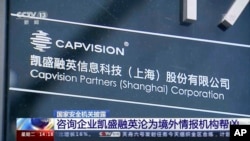International business consultancies operating in China that provide economic data to potential investors appear to be headed into a period of greater scrutiny as of July 1, when a revised espionage law expands the list of activities Beijing considers spying.
The consultancies assist companies and individuals seeking profit from the world's second-largest economy by doing deep background reports before money flows into China. And while China's economic policymakers advocated in March for more foreign investment to restore an economy stalled by Beijing's draconian COVID-19 pandemic restrictions, that position runs counter to President Xi Jinping's national security concerns.
Capvision, with headquarters in Shanghai and New York, is the latest company to run afoul of the current law and Beijing's contradictory messages, when officers from the Ministry of State Security raided its offices in Shanghai, Beijing and other Chinese cities on May 8. The incursion was part of an ongoing crackdown on foreign businesses such as Bain & Company, raided in April, and the Mintz Group, closed in March.
Capvision, which has more than 1,000 clients worldwide, "became an accomplice of foreign intelligence agencies," according to China Central TV, the country's largest official TV channel, by gathering information in key industries including military defense, finance and monetary policy, high technology, energy resources, medicine and health.
A day later, the company said in a statement, "The punishment and rectification requirements of the national security authorities are … a wake-up call for the standardized development of the business consulting industry."
A source from a global corporate advisory firm in Shanghai, who asked for anonymity to avoid attracting official attention, told VOA Mandarin, "There is currently a sense of unease across the consulting industry. … But the situation is still evolving and it's not clear how deep the crackdown will be. … Some companies may choose to over-comply with the law, so as to minimize the chance of their work being construed as espionage or endangering national interests."
Road-use data
Dennis Kwok, a former pro-democratic lawmaker expelled from Hong Kong, is now a partner with New York law firm Elliott Kwok Levine & Jaroslaw representing international businesses and advising on cross-border commercial transactions involving the People's Republic of China and Hong Kong.
Kwok told VOA Mandarin on Monday that Beijing began scrutinizing what it considered sensitive information headed overseas in June 2021 when China's leading online ride-sharing company, Didi Global, listed on the New York Stock Exchange.
Days later, Chinese regulators launched an investigation of Didi's handling of customer data, amid official concern that sensitive information on topics such as road use would flow into the hands of the U.S. government or regulators, according to Kwok.
In December, Didi announced it would withdraw from the NYSE to pursue a Hong Kong listing. Reuters reported that Chinese regulators had pressed Didi's top executives to delist from the NYSE because of concerns about data security.
'Obsessed' with security
Kwok told VOA Mandarin that totalitarian states like China are "obsessed" with national security and regard anything to do with national interests as national security.
In December 2017, Xi made it clear during a speech at the signing of training regulations for the People's Liberation Army that China's information was a national security issue and he wanted to win the information war with the outside world. At the time, China's national security law, implemented in July 2015, already included at least 15 topics within the scope of state secrets and national security control. These included national defense, economy, finance, space, information and food security.
In April, China updated its law, and the expanded version takes effect July 1 in ways that appear likely to further restrict the information consultants can collect.
"This is China's attempt to set a red line that people won't dare to cross, but the problem is that this new law is so tough, detailed and broad that you can't possibly follow it," Kwok said. "The authorities know that, but they don't care if you can comply with the law. They only care that there are legal mechanisms to prosecute those who break the law."
Kwok believes that Beijing's crackdown will expand to target U.S. auditors and law firms operating in China. In February, The Guardian, citing Bloomberg, reported that the Chinese government wanted state-owned companies to protect their data by using local or Hong Kong auditors.
Dancing a dance
CY Huang, a veteran Taipei-based investment banker and president of FCC Partners, told VOA Mandarin that Beijing's expansion of its counterespionage law is little more than another step in the geopolitical dance of the U.S. and China.
He said Washington and Beijing have similar patterns when they accuse businesses of threatening national security.
Huang told VOA Mandarin by phone on May 12 that China is countering "the U.S. with counterespionage laws and by overhauling consulting firms" following Washington's imposition of controls on exports of advanced semiconductor chips and equipment to China.
He said Beijing is not worried that foreign investors will be scared off when the counterespionage law takes effect in July.
"China's market is huge and still has tremendous business opportunities to attract foreign investment," he said.
Huang said the Chinese authorities are relatively tolerant of foreign companies and will not force them to rectify perceived violations as strictly as they did Chinese companies such as internet giants Ant Group in 2020 and Tencent Corp. in 2021.
He added, "The very strong message is: Pay attention, everyone. It's fine you do proper commercial due diligence, but you cannot do too much; there is a red line, you cannot touch national security. What exactly is national security? This is for everyone to judge by themselves."
Bo Gu contributed to this report.






